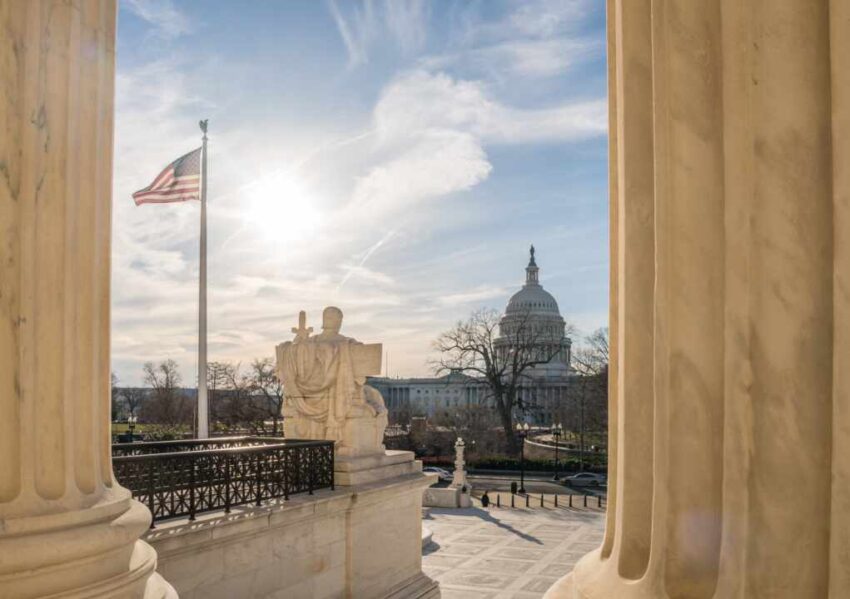Justice Amy Coney Barrett’s abrupt, three-minute speech and swift exit at the Seventh Circuit Judicial Conference has ignited speculation about judicial transparency and the future direction of the Supreme Court.
Story Snapshot
- Justice Barrett delivered an unusually brief keynote at a major legal conference, highlighting collegiality and professionalism.
- Her sudden departure left attendees questioning her intentions and sparked discussion about her influence on the judiciary.
- Barrett’s moderate record and unpredictable voting patterns continue to shape the Supreme Court’s dynamics.
- She teased a forthcoming memoir, adding intrigue to her role and future impact in American law.
Barrett’s Unprecedented Brevity: A Stark Departure from Judicial Norms
Justice Amy Coney Barrett, the youngest member of the Supreme Court, commanded the attention of hundreds at the Seventh Circuit Judicial Conference in Chicago by delivering a keynote address lasting only three minutes. Instead of offering sweeping legal commentary or addressing contentious national issues, Barrett urged the judiciary to embrace optimism, collegiality, and professionalism. Her remarks underscored the need for decorum and mutual respect—values that resonate with those who have grown frustrated with ideological grandstanding and the erosion of traditional American principles. Yet her swift exit from the event immediately after her remarks set off a wave of speculation among judges and legal professionals, raising questions about transparency and the motives behind such an unorthodox appearance.
Justice Barrett teases new memoir in abrupt conference exithttps://t.co/FLLZIIoxmk
— BREAKING NEWZ Alert (@MustReadNewz) August 20, 2025
Barrett’s speech came at a pivotal moment, with the Supreme Court under intense scrutiny as Americans look to the judiciary for stability amid shifting national priorities. Unlike past keynote speakers who used the platform to delve into policy or the Constitution’s role in the modern era, Barrett’s brevity stood out. Conference attendees—seasoned judges and legal professionals—were left wondering whether her concise message signaled a broader approach to judicial engagement or was simply a prelude to her forthcoming memoir, “Listening to the Law: Reflections on the Court and Constitution.” Her focus on collegiality is consistent with previous statements, but the lack of substantive discussion left some attendees searching for deeper insights into her judicial philosophy and future intentions.
Collegiality and Professionalism: A Shield Against Partisanship
Barrett’s emphasis on collegiality and professionalism comes at a time when the judiciary faces unprecedented attacks from activists and politicians pushing for radical change. In her remarks, she called on judges to maintain mutual respect despite sharp ideological disagreements—an implicit rebuke of the divisiveness that has plagued other branches of government. This message aligns with the values of many Americans who believe the judiciary should remain a bulwark against political overreach and “woke” agendas. Her record, described as both moderate and unpredictable, has made her a central figure in recent court terms, with liberals expressing frustration over her refusal to side with left-leaning justices on key issues. Conservatives, meanwhile, remain watchful, hoping her actions will continue to defend constitutional principles and limited government.
Barrett’s recusal practices have drawn praise from judicial watchdogs, distinguishing her from other federal judges. Her history of stepping aside in cases where potential conflicts existed stands as a model of judicial ethics and transparency. This commitment to integrity reassures those concerned about government overreach and the politicization of the courts. As a result, Barrett’s conduct not only shapes the culture within the judiciary but also reinforces the expectation that Supreme Court justices uphold the highest standards of impartiality and fairness.
Memoir Tease and Judicial Influence: What Comes Next?
The speculation surrounding Barrett’s abrupt departure intensified with her tease of an upcoming memoir, which promises to shed light on her views of the Constitution and the future of the Supreme Court. The legal community and the American public alike are eager for insight into the philosophy and motivations of a justice whose votes have proven difficult to predict. Her memoir is expected to address both her experiences on the bench and her perspective on the judiciary’s role in safeguarding the nation’s founding principles. This development is especially significant given the current climate, in which Americans remain vigilant against attempts to undermine the Constitution, restrict gun rights, or erode family values.
In the short term, Barrett’s speech may influence judicial culture by encouraging greater collegiality and professionalism among federal judges. In the long term, her central role on the Supreme Court and the content of her memoir could shape court dynamics for years to come. Legal analysts and court watchers will be paying close attention as the release date approaches, seeking clues about how her philosophy will impact critical decisions on issues ranging from religious liberty to the limits of government power.
Barrett’s brief remarks and the ensuing speculation highlight broader debates about judicial conduct, transparency, and the evolving role of the Supreme Court in American society. As the nation continues to grapple with challenges to constitutional rights and traditional values, the actions and words of justices like Barrett take on heightened significance. For conservatives concerned with upholding the nation’s legal and moral foundations, her conduct at the conference is a reminder of the importance of vigilance and engagement in the ongoing battle to preserve the integrity of the judiciary.
Sources:
Justice Barrett teases new memoir in abrupt conference exit
Conflict U: Two Dozen Federal Judges Did Not Recuse in Cases Involving the Universities Where They Teach
Amy Coney Barrett Thinks Collegiality Keeps The Legal Profession From Being Bleak
Seventh Circuit Judicial Conference 2025 Registration
Click this link for the original source of this article.
Author: Editor
This content is courtesy of, and owned and copyrighted by, https://republicanpost.net and its author. This content is made available by use of the public RSS feed offered by the host site and is used for educational purposes only. If you are the author or represent the host site and would like this content removed now and in the future, please contact USSANews.com using the email address in the Contact page found in the website menu.





